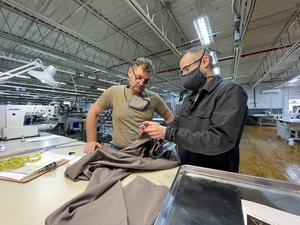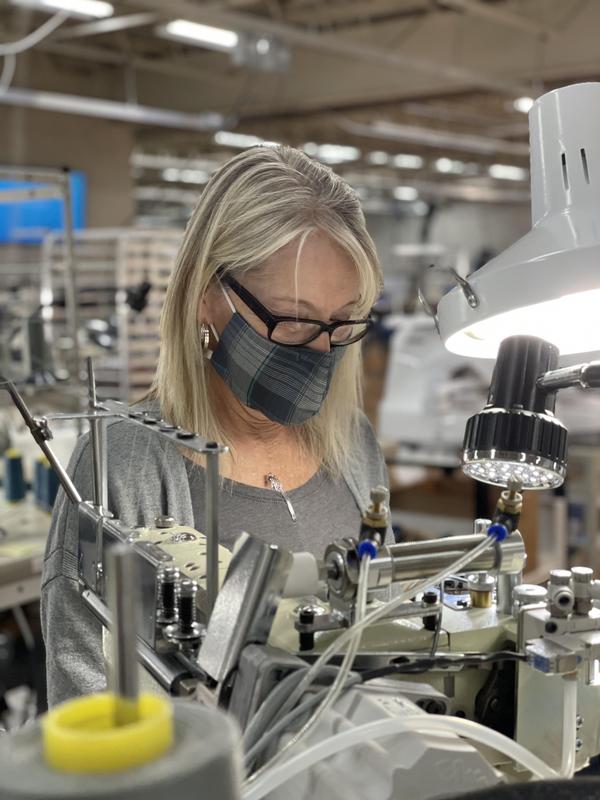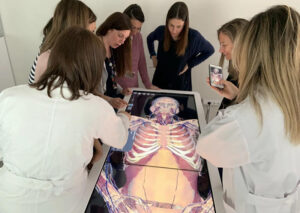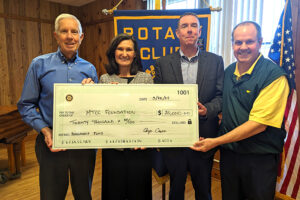The industrial sewing class, and other related classes that are being planned for January and beyond, are offered in partnership with McDowell Technical Community College and are funded by the Higher Education Emergency Relief Fund (HEERF), a federal pandemic grant program. While a few students in the program qualify for OJT (on-the-job-training) funds through NC Works, the majority of salaries for this first class of students has been shouldered by Kitsbow.

“We are excited to partner with Kitsbow to bring new jobs and higher-level, short-term training to folks living in Old Fort and surrounding areas,” said Stacy Buff, Dean of Career and Technical Education. “Kitsbow is an outstanding partner, not only for the college, but for our community as well. They are committed to making industry-leading, high-quality products that are certain to make the company a mainstay in the U.S. apparel industry and ensure longevity for employees at the company. Their investments in equipment, manpower and education are certain to pay dividends for economic development in the region for years to come.”
What makes the Kitsbow program unique among industrial sewing classes is the focus on “one piece flow,” a manufacturing process closely aligned with the global trend toward “lean manufacturing.” Manufacturers who adopt one piece flow methods complete individual products or very small batches of products—in this case, apparel—before starting the next garment or product.
Most traditional manufacturers produce large batches of product in phases. Employees at these companies might sew the cuffs on 5,000 left sleeves of a shirt before sewing the cuffs on 5,000 right sleeves, and so forth. Batch processors produce large quantities of a product and keep them in stock until ordered by a customer.
One piece flow manufacturers, on the other hand, produce garments or other products as orders are placed by customers, a process considered more efficient and less costly than batch processing. Not only is there a shorter lead time for production, there is also no need for immense storage facilities for supplies needed for production and storage needed for completed products. By producing only what is ordered, there is also less material and labor wasted on items for which there is ultimately less demand. Design flaws or other manufacturing errors can be caught quickly in a one piece flow system, reducing the cost of errors and minimizing down time for error correction.

“This is revolutionary stuff within the sewing industry,” said David Billstrom, Kitsbow CEO (Chief Executive Officer). “We have an opportunity to make a real difference in creating industrial sewers who are both technically skilled AND understand the one piece flow methodology, which can reduce labor times to rates comparable to offshore labor charges!
“Our goal,” said Billstrom, “is to make premium apparel right here in North Carolina. We will achieve that by focusing not only on literal sewing skills, but on the ‘how and why” of one-piece-flow sewing: following a sequence of construction, working within a team, spotting manufacturing issues or errors, knowing when to repair a mistake (spoiler alert—DON’T), requesting changes to cut pieces, and maintaining continuous quality control.”
The initial group of 5 students in the Kitsbow sewing class have worked with trainer Jacob Fisher in three different areas of the Kitsbow production floor in Old Fort since the class started in mid-November. Students will have worked twenty shifts of 8 hours each by the end of class time this week.
“We estimate that it will take two classes of twenty shifts each for a student to become a proficient, one-piece-flow industrial sewer,” said Billstrom. Students who complete both classes will receive a certificate for participation in the program, which counts towards an eventual credential in industrial sewing. And importantly, graduates will be invited to interview for regular production sewing jobs that range from $15 to 20 per hour with full benefits, including 100% health care coverage.
In addition to the sewing class, Kitsbow is also recruiting for a sewing technician class for those interested in working on a variety of industrial sewing machines. Kitsbow has $100,000 worth of equipment currently dedicated to student training and will soon add more sewing machines and other equipment for both production and training purposes.
Kitsbow aims to make the recruiting process for students and employees all about community. Their target population for new recruits is Old Fort and the surrounding hills and valleys. “These are our people,” said Billstrom, signifying Kitsbow’s identity as an Old Fort business and community partner. “We also know that these folks will have short commute times, which is good for them and us. Our job is to find these folks, recruit them and offer them a shot at success. This is our future and we are beyond excited!”
Before Kitsbow started hiring folks to work in their Old Fort facility just over two years ago, they were purchasing 85% of the products they sold from contract employees in Vietnam, known around the world for high-quality sewing operations. When they made the bold commitment to shift production of all of their apparel to the United States, some in the apparel industry were skeptical of the wisdom of Kitsbow’s decision. Even today, only 2% of apparel sold in the United States is made in the United States.
“When you buy a Kitsbow product today,” said Billstrom, “you can be certain that an American made all of it. And in doing so, you are helping us bring back the skill of crafting premium apparel here in America.”
“McDowell Tech is laser-focused on supporting our business partners and creating equitable solutions for economic development in McDowell County and throughout our region,” said Dr. Brian S. Merritt, MTCC President. “Our training partnership with Kitsbow is a model for how to target college resources where we know students will end up with a careers and family-sustaining wages.”
Individuals who are interested in joining the next sewing class should immediately contact Kitsbow via their careers website, https://kitsbow.freshteam.com/jobs, and click to apply for the next class.
About Kitsbow
Kitsbow was established in Sonoma County, California, eight years ago by dedicated mountain bikers and apparel industry veterans. Because its designers have logged years in the saddle, each detail is obsessively considered. Every element — down to zippers and reflective piping — is vetted for quality, style, and durability.
Relocating its manufacturing to Old Fort, North Carolina in 2019, Kitsbow is committed to a Just-in-Time manufacturing model, minimizing waste and maximizing flexibility to serve the customer. All products are packaged in compostable packaging, as well as all shipping materials, ready to return to the Earth in the customer’s own garden. Kitsbow is a Bicycle Friendly Business, designated at the highest level (Platinum) by The League of American Bicyclists.
Photos Courtesy of Kitsbow:
(All PPE worn in photos was sewn by Kitsbow.)
Dave Smith (Maker II) with Jacob Fisher (Lead Maker + Trainer)
Sarah Wahl (Maker I) with Scott Thompson (Lead Maker + Trainer)
Karen Rodgers (Maker II)



